Sleep Training a Breastfed Baby: Is Nursing To Sleep Okay?
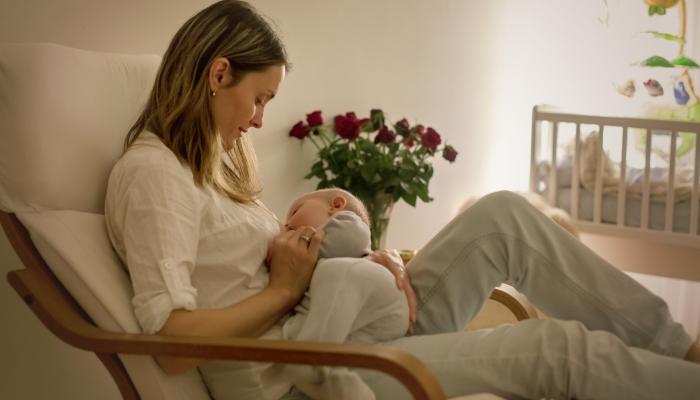
- Sleep is important for every member of the family. Your baby needs enough sleep to allow for healthy development, and you need enough sleep to ensure you can care for your baby.
- Sleep training teaches your baby to self-soothe at night so they can get to sleep without help. Learning to self-soothe will enable your baby to get back to sleep on their own in the middle of the night.
- Sleep training isn’t mandatory. Your child will eventually figure out how to fall asleep without your help. If you want to sleep train, go for it, but don’t feel you have to do it just because everybody else is (or your mother-in-law is telling you to).
- There are various sleep training methods, from the controversial Cry It Out method to gentler sleep solutions. Though the gentle sleep teaching methods take longer, many parents find them preferable to crying.
There is nothing quite like the sleep deprivation you suffer at the chubby little hands of your baby. It’s the kind of tiredness that makes your teeth ache and hair follicles tingle. And when you’re months into the sleep deprivation, you would try just about anything to get a good night’s sleep.
Many parents turn to sleep training to encourage their babies to sleep better at night. Though sleep training gets a bad rap, there are gentle ways to encourage your baby to soothe themselves to sleep.
Some moms worry that sleep training isn’t compatible with breastfeeding, but it’s fine to do both. If you’ve decided to sleep train your baby, there’s no reason why you need to stop breastfeeding them. Sleep training a breastfed baby isn’t too different from sleep training a formula-fed baby.
What Is Sleep Training?
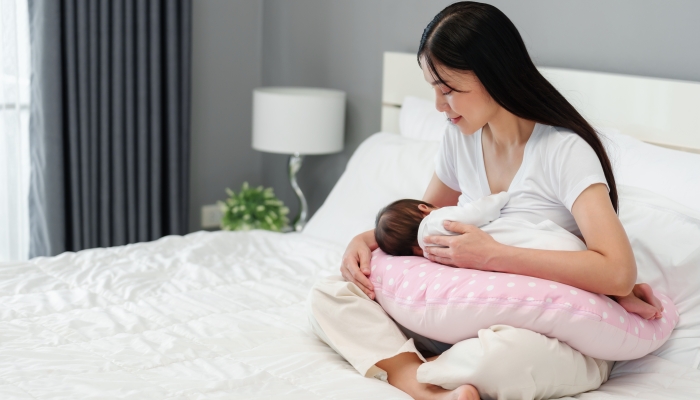
Sleep training simply refers to teaching your baby how to fall asleep by themselves. There are various methods that fall under the umbrella term ‘sleep training,’ and some are more controversial than others.
Sleep training is the act of teaching your baby to sleep independently without the use of a sleep prop. Sleep props include feeding, rocking, swaying, lullabies, etc.
By the time you finish sleep training, your baby should be able to fall asleep without help. During sleep teaching, you put your child down while they are drowsy but not in a deep sleep so they fall asleep on their own. This process takes some getting used to, and it may take a while before your baby masters the art of drifting asleep without help.
The key is to think of sleep teaching as a long-term project, not something you’re going to complete by the end of the week. Remember, slow and steady wins the race.
Can I Sleep Train and Breastfeed My Baby at the Same Time?
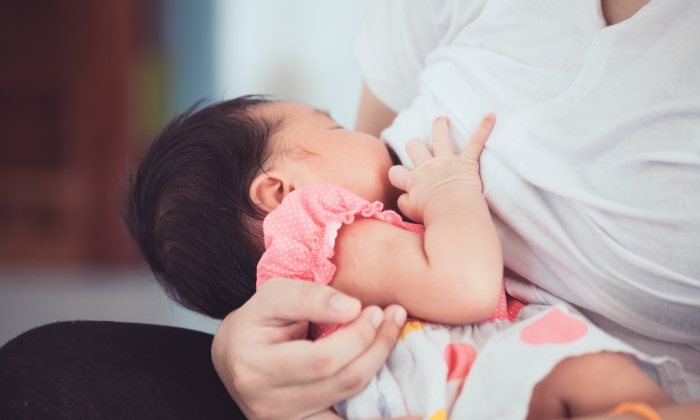
Yes, you can absolutely continue to breastfeed while sleep-training your baby. Though there are plenty of myths that sleep teaching won’t work for a breastfed baby, it is possible to sleep train a breastfed baby. There are so many benefits to breastfeeding, so don’t feel you need to stop breastfeeding to get a good night’s sleep.
Newborn babies wake for feeds during the night. This is entirely normal and to be expected, though it comes as a nasty shock to most new parents. This is why you shouldn’t try to sleep train a newborn baby (try these tricks instead); they are not developmentally ready to go long stretches without milk. As your baby grows, they will become less reliant on night feeds.
During the newborn phase, frequent night feedings help to keep your breast milk supply up, too. The more frequently your baby feeds, the more frequently your breasts will be stimulated to make milk. This is important for building your breast milk supply, especially during the early months. By the time your baby is four months old, your milk supply should be well established and able to go without night feeds without being negatively impacted.
If your baby isn’t ready to drop their night feed just yet, don’t worry, you can still feed them in the night even when sleep training a breastfed baby. Though this might sound counterintuitive, feeding and sleeping are separate issues. The key is to feed your hungry baby and then place them back in their sleep space awake. This way, they are not falling asleep at the breast, and they won’t be disturbed next time they wake to find you gone.
Sleep Training a Breastfed Baby vs a Formula-Fed Baby: Is There a Difference?
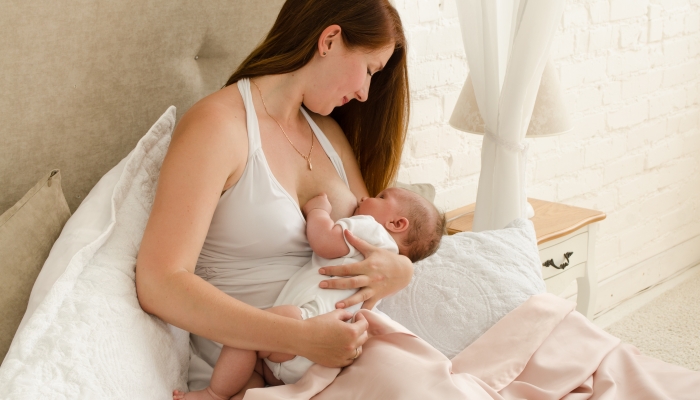
Many people believe formula-fed babies sleep better than their breastfed counterparts, but is this based on fact or fiction? While breastfed babies wake more frequently to feed during the early months of life, by the age of six months, breastfed babies are comparable to formula-fed babies.
In a paper presented at the American Academy of Pediatrics National Conference, sleep disruption for breastfed babies is temporary11. American Academy of Pediatrics. Sleep disruption for breastfed babies is temporary, study finds. ScienceDaily. 2011. https://www.sciencedaily.com/releases/2011/10/111017092037.htm, and the AAP encourages mothers to continue breastfeeding22. Feldman-Winter, L, MD, MPH, FAAP. Breastfeeding: AAP Policy Explained. healthychildren.org. 2022. https://www.healthychildren.org/English/ages-stages/baby/breastfeeding/Pages/Where-We-Stand-Breastfeeding.aspx until age two.
“Families are often concerned that their baby will not sleep as well due to breastfeeding,” according to Dr. Jodi Mindell, the lead author of the paper titled Long-Term Relationship Between Breastfeeding and Sleep33. Mindell, J.. Long-Term Relationship Between Breastfeeding and Sleep. Children’s Health Care. 2012;41(3), 190-203. https://doi.org/10.1080/02739615.2012.685038. “Our study found that although it is true that bottle-fed babies wake less often at night and sleep for longer stretches than babies who are nursing, there are no differences in total amount of sleep. And more importantly, six months later there are no differences in sleep skills.”
Many people mistakenly believe feeding to sleep is a breastfeeding problem, but formula-fed babies are just as likely to fall asleep on the bottle. When they wake to find the bottle gone, they’ll want you to help nurse them back to sleep.
How to Tell if Your Breastfed Baby Is Ready for Sleep Training
There’s no point in starting sleep training until your baby is ready. Here are some signs to look for so you can know if your baby is developmentally ready to self-soothe at night:
Your baby is at least four months old
Before this age, your baby won’t be developmentally ready for sleep training. Though old-fashioned sleep training manuals may claim otherwise, newborns are not able to self-soothe. A baby must be four months old before they are ready to get themselves to sleep.
Some parents prefer to wait until their baby is six months old before beginning sleep training. It’s up to you when you start, and how long you wait will likely be dictated by how exhausted you are.
Your baby isn’t getting enough sleep
If your baby is grumpy a lot of the time, they may need more sleep. Sleep is vital for your baby’s development, and your baby may be ready for sleep training if they’re not clocking up enough hours of rest.
Sleep isn’t just important for babies; your sleep is vital too! You may have noticed that without a healthy amount of sleep, your immune system suffers, and your mental health takes a nosedive. It’s ok to teach your baby to sleep better to protect your own sleep. It’s not selfish; you need to take care of yourself, so you can take care of your baby.
How Long Does It Take to Sleep Train a Breastfed Baby?
Though you might be sleep deprived and desperate for a quick fix, gentle sleep training isn’t going to happen overnight. With consistency and encouragement, you can teach your baby to get some good quality baby sleep independently.
There is no one-size-fits-all approach to sleep training. While some babies get it within days, others are still learning to self-soothe months later. It’s impossible to predict how fast your baby will pick it up, but the sooner you start, the sooner you’ll finish, no matter how long it takes.
Tips on How to Successfully Sleep Train Your Breastfed Baby
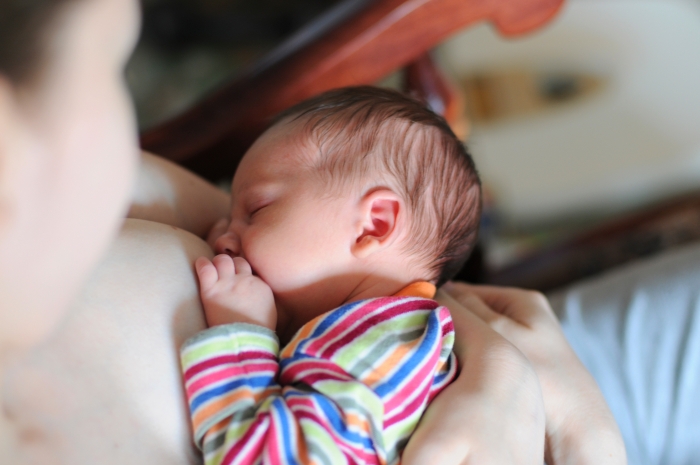
Sleep training is a means to an end. Keep imagining those eight-hour stretches of blissful uninterrupted sleep as you slowly work towards sleep training your baby. Here are some useful tips to help you succeed:
Choose your method carefully
All families are different, and what works for the family next door won’t necessarily work for you. If you know you can’t bear to hear your baby cry, give the Cry It Out method a miss. While this method may work for some, it’s not going to work for you if you can’t be consistent.
If you know a gentler method is going to be easier to stick to, try the Pick Up Put Down method. In this method, you can lift your baby and cuddle them to soothe them if they become upset. Once they’re settled, you place them back in their sleeping place. This method is slower but gentler, and if that’s better for you as a family, then it’s the one worth trying first.
Create a consistent sleep environment
To fall asleep, your baby needs a sleep environment they can relax in. Keep the room dark or dimly lit, make sure it’s the right temperature, and that your baby is wearing a clean diaper. Eliminate all potential discomforts so your child can focus on chasing those zzz’s and your baby’s sleep isn’t disrupted.
Establish a bedtime routine
If your breastfed baby is used to falling asleep at the breast, you’ll need to replace that sleep cue with something else. It’s important to wind down at the same time each day, especially during sleep training. Some parents include a bath, a baby massage, and a bedtime story in their bedtime routine at the end of the day. In time, your baby will begin to associate these things with bedtime.
Don’t feed your baby to sleep
Though there’s no harm in feeding your baby to sleep, this could be one of the reasons why your baby wakes in the middle of the night. If your baby falls asleep at the breast and wakes up to find you gone, this could be why they cry out for you.
It’s perfectly ok to feed your baby just before they fall asleep, but you want to avoid them falling asleep at the breast. If they do drift off, you should gently wake them before placing them back in their crib. You want your baby to be drowsy but awake when you place them in their cot so that it’s not a surprise to them when they wake up there.
Wait five minutes before feeding your baby in the night
Though your baby may be used to night feeds, they may not always need them. If your baby usually has a full feed in the night, this is a sign they’re hungry. If they’re only feeding for a couple of minutes before falling asleep at the breast, however, it’s more likely to be comfort nursing.
Wait at least five minutes before offering your baby the breast; you may find they fall back asleep by themselves in that time. If they still want to feed after five minutes, put them down drowsy but awake once the feed is over. Each time you do this, you teach your baby that they can fall asleep independently. Eventually, all your hard work will pay off!
Be consistent
The most important thing is to be consistent and stick to it. It will work eventually, so keep encouraging your child to fall asleep without help. Make sure all caregivers are on the same page and you’re all working towards the same goal. If there’s inconsistency, your baby won’t know what to expect from one day to the next.
Expect a bumpy road ahead
Things don’t always go to plan. If your baby goes through a sleep regression or is feeling under the weather, you may have a bad night. It can sometimes feel like taking a step backward, but try not to think of sleep teaching as a linear process.
There will be good nights and bad nights, but as long as the general trend is moving in the right direction, you’re doing a great job and your baby will be sleep trained. Remember, you got this, mama.
References
- American Academy of Pediatrics. (2011, October 17). Sleep disruption for breastfed babies is temporary, study finds. ScienceDaily. https://www.sciencedaily.com/releases/2011/10/111017092037.htm
- Feldman-Winter, L, MD, MPH, FAAP. (2022, July 18). Breastfeeding: AAP Policy Explained. healthychildren.org. https://www.healthychildren.org/English/ages-stages/baby/breastfeeding/Pages/Where-We-Stand-Breastfeeding.aspx
- Mindell, J. (2012). Long-Term Relationship Between Breastfeeding and Sleep. Children’s Health Care, 41(3), 190-203. https://doi.org/10.1080/02739615.2012.685038
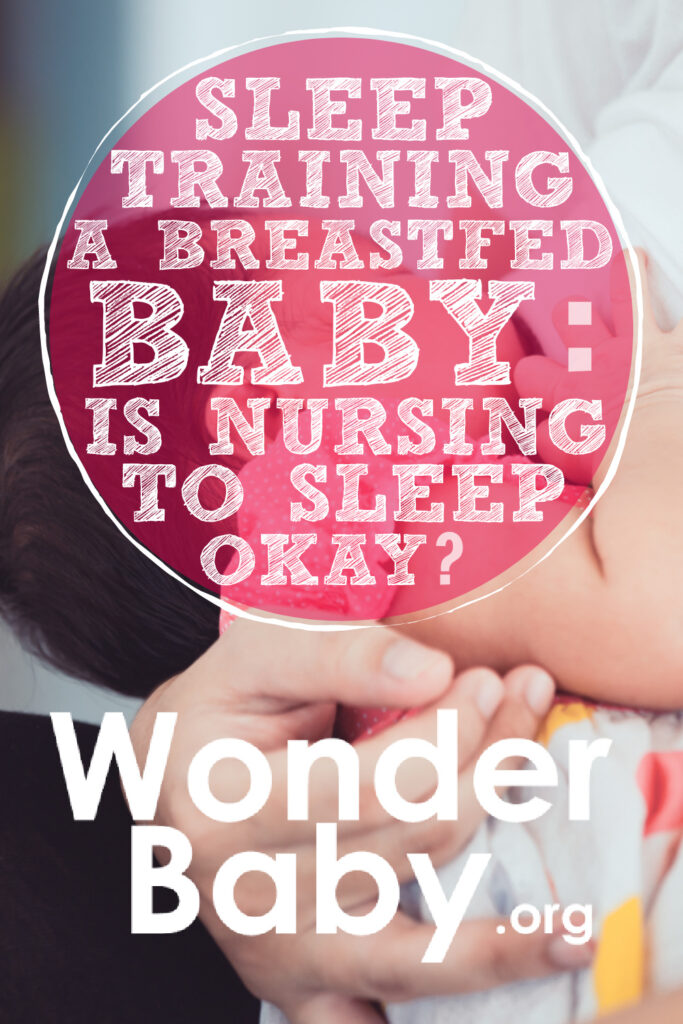
Related Posts
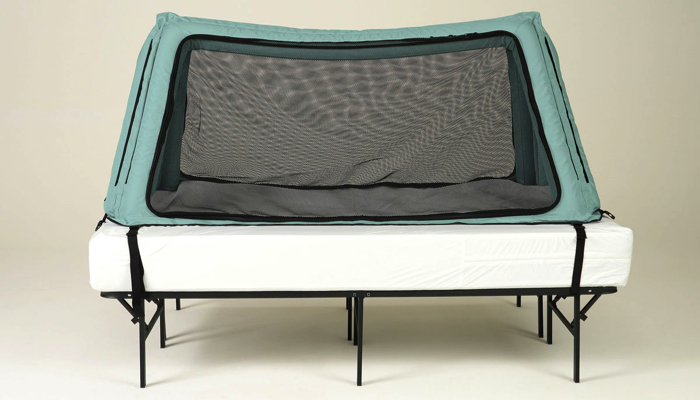
Sleep, Special Needs
Safe Place Bedding Travel Bed Review
Traveling with a special needs child can be stressful! Having a safe, durable, and easy to use travel bed can make traveling so much easier!
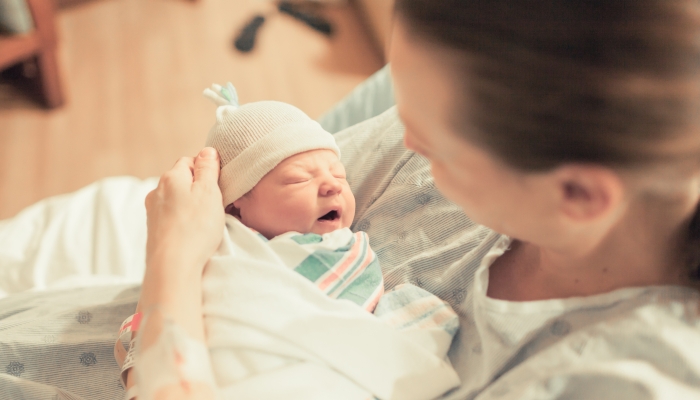
Sleep, Special Needs
Sleep Regimen for Premature Babies: Special Considerations
It can take premature babies much longer than their full-term peers to sleep for long stretches. A preemie sleep schedule may encourage better sleep.
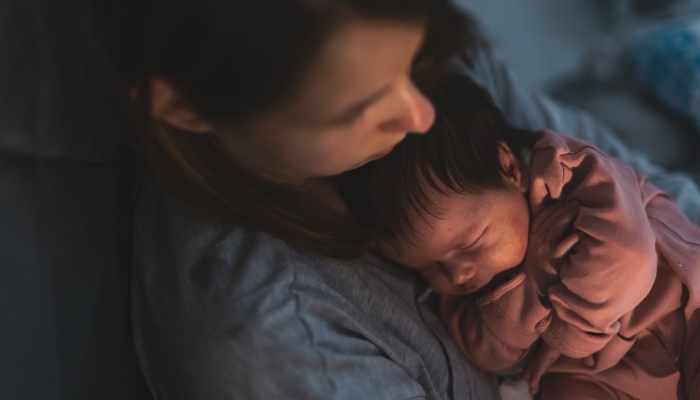
Sleep
Mastering the Bedtime Routine: 3 Tips for a Peaceful Night’s Sleep
From around six weeks, a newborn bedtime routine can help your baby learn the difference between day and night and prepare for a restful night’s sleep.